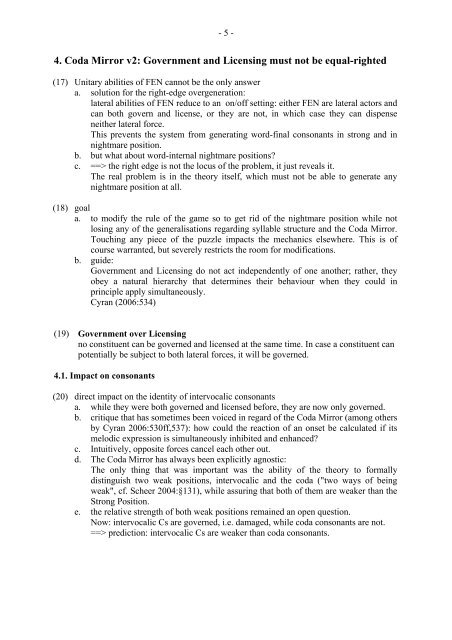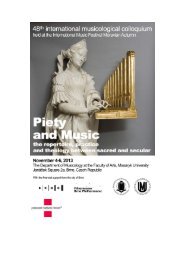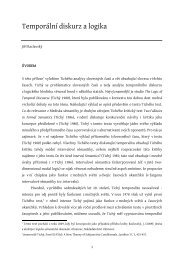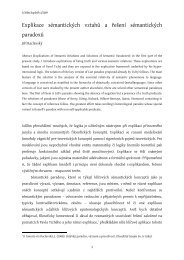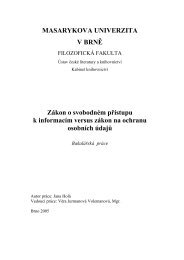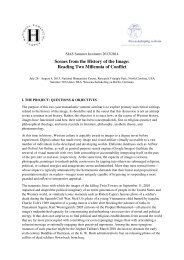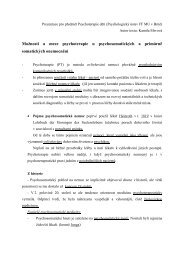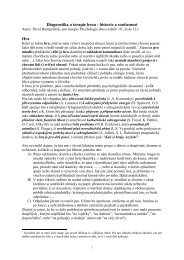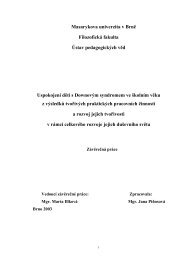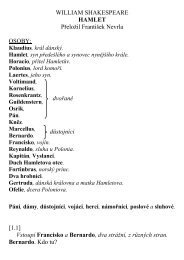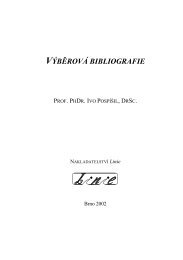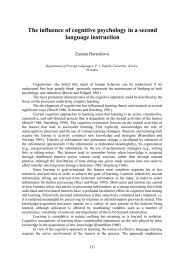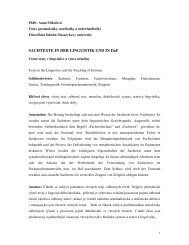The Coda Mirror v2 (but not exactly 2.0) - Masarykova univerzita
The Coda Mirror v2 (but not exactly 2.0) - Masarykova univerzita
The Coda Mirror v2 (but not exactly 2.0) - Masarykova univerzita
You also want an ePaper? Increase the reach of your titles
YUMPU automatically turns print PDFs into web optimized ePapers that Google loves.
- 5 -<br />
4. <strong>Coda</strong> <strong>Mirror</strong> <strong>v2</strong>: Government and Licensing must <strong>not</strong> be equal-righted<br />
(17) Unitary abilities of FEN can<strong>not</strong> be the only answer<br />
a. solution for the right-edge overgeneration:<br />
lateral abilities of FEN reduce to an on/off setting: either FEN are lateral actors and<br />
can both govern and license, or they are <strong>not</strong>, in which case they can dispense<br />
neither lateral force.<br />
This prevents the system from generating word-final consonants in strong and in<br />
nightmare position.<br />
b. <strong>but</strong> what about word-internal nightmare positions?<br />
c. ==> the right edge is <strong>not</strong> the locus of the problem, it just reveals it.<br />
<strong>The</strong> real problem is in the theory itself, which must <strong>not</strong> be able to generate any<br />
nightmare position at all.<br />
(18) goal<br />
a. to modify the rule of the game so to get rid of the nightmare position while <strong>not</strong><br />
losing any of the generalisations regarding syllable structure and the <strong>Coda</strong> <strong>Mirror</strong>.<br />
Touching any piece of the puzzle impacts the mechanics elsewhere. This is of<br />
course warranted, <strong>but</strong> severely restricts the room for modifications.<br />
b. guide:<br />
Government and Licensing do <strong>not</strong> act independently of one a<strong>not</strong>her; rather, they<br />
obey a natural hierarchy that determines their behaviour when they could in<br />
principle apply simultaneously.<br />
Cyran (2006:534)<br />
(19) Government over Licensing<br />
no constituent can be governed and licensed at the same time. In case a constituent can<br />
potentially be subject to both lateral forces, it will be governed.<br />
4.1. Impact on consonants<br />
(20) direct impact on the identity of intervocalic consonants<br />
a. while they were both governed and licensed before, they are now only governed.<br />
b. critique that has sometimes been voiced in regard of the <strong>Coda</strong> <strong>Mirror</strong> (among others<br />
by Cyran 2006:530ff,537): how could the reaction of an onset be calculated if its<br />
melodic expression is simultaneously inhibited and enhanced?<br />
c. Intuitively, opposite forces cancel each other out.<br />
d. <strong>The</strong> <strong>Coda</strong> <strong>Mirror</strong> has always been explicitly agnostic:<br />
<strong>The</strong> only thing that was important was the ability of the theory to formally<br />
distinguish two weak positions, intervocalic and the coda ("two ways of being<br />
weak", cf. Scheer 2004:§131), while assuring that both of them are weaker than the<br />
Strong Position.<br />
e. the relative strength of both weak positions remained an open question.<br />
Now: intervocalic Cs are governed, i.e. damaged, while coda consonants are <strong>not</strong>.<br />
==> prediction: intervocalic Cs are weaker than coda consonants.


